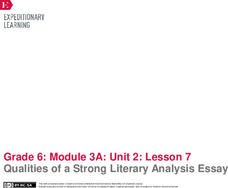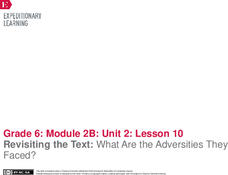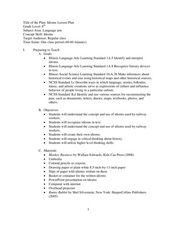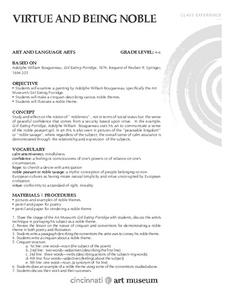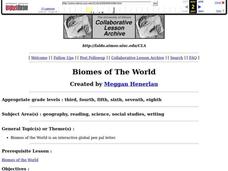EngageNY
Qualities of a Strong Literary Analysis Essay
Read like a writer. Scholars read a model literary analysis in preparation for a similar writing assignment before annotating each paragraph for the gist. Next, pupils devise a list of qualities of a strong literary analysis essay.
EngageNY
Planning for Writing: Introduction and Conclusion of a Literary Analysis Essay
First and last impressions are important. Using the helpful resource, scholars draft the introductory and concluding paragraphs of their literary analysis essays. Next, they use a writing evaluation rubric to self-assess their work.
EngageNY
End of Unit 2 Assessment: Final Literary Analysis
Get ready to review and revise! Scholars peer edit each other's literary analysis essay drafts. Next, using peer and teacher feedback, pupils compose their final drafts.
Curated OER
Pick A Short Story
Students select a short story and apply various literary elements they have used throughout the year. They deconstruct a short story according to plot, setting, characterization, and theme. Students create a PowerPoint.
Premier Literacy
Point of View
Incorporate technology into a literature lesson with an innovative language arts lesson. Middle schoolers read an electronic version of original stories or fairy tales, and after determining the point of view, rewrite the tale from a...
EngageNY
Making a Claim: Moon Shadow’s Point of View of the Immediate Aftermath
Body paragraphs are the building blocks of every essay. Pupils view and discuss a model essay using a rubric to evaluate one of its supporting paragraphs. Next, scholars use what they've learned to continue drafting their own literary...
EngageNY
Revisiting the Text: What Are the Adversities They Faced?
Where's the evidence? Scholars take a look at the evidence section of a Literary Argument Essay Rubric. They discuss terms used in the rubric and then begin thinking about collecting evidence for their own essays. They also revisit their...
Curated OER
Idioms Lesson Plan
Sixth graders discover idioms. In this idioms lesson, 6th graders evaluate idioms and discover their meaning. Students read Runny Babbit by Shel Silverstein and create unique idioms. Assessment rubric is provided.
Curated OER
Flashbacks
Learners create a piece of original fiction utilizing flashbacks. Students define and identify the use of flashbacks in the novel Holes. Definitions and examples are recorded in student journals. They use their examples as springboard...
Curated OER
Virtue And Being Noble
Young scholars write and illustrate original cinquains based upon the ideas of nobility and virtue. The lesson includes a vocabulary list of key terms and rubric for student reflection and assessment. This is intended for a 4th through...
Curated OER
Building a Literature Pyramid
Students create a literature pyramid. They review and discuss their assessment task and rubric and select the literature for their pyramid. They read the literary selection and complete a pyramid sheet for one of the four literary...
Curated OER
Zero The Hero, Trout The Lout
Students use a graphic organizer create a character sketch of Trout Walker from the novel Holes. Using the provided worksheet, students fill in the important character traits of Trout. Worksheet and answer key are provided with the lesson.
Curated OER
Biomes of The World
Young scholars research different biomes, using links from global pen pal letters.
Curated OER
Lesson Plan 2--3000 B.C. to 2000 A.D.?
Learners, in groups, study the different writing systems from 3000 B.C. to 2000 A.D.


